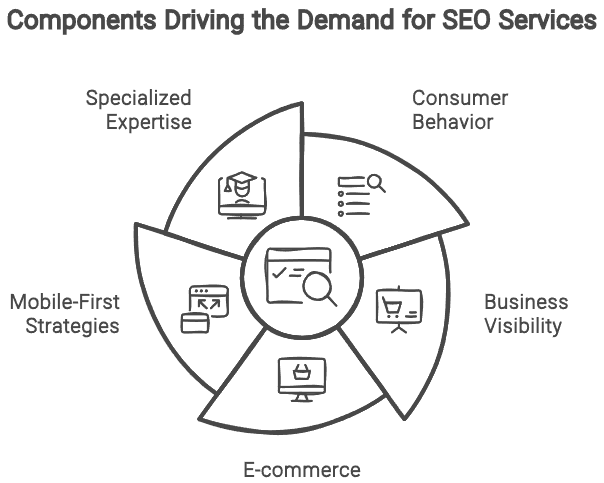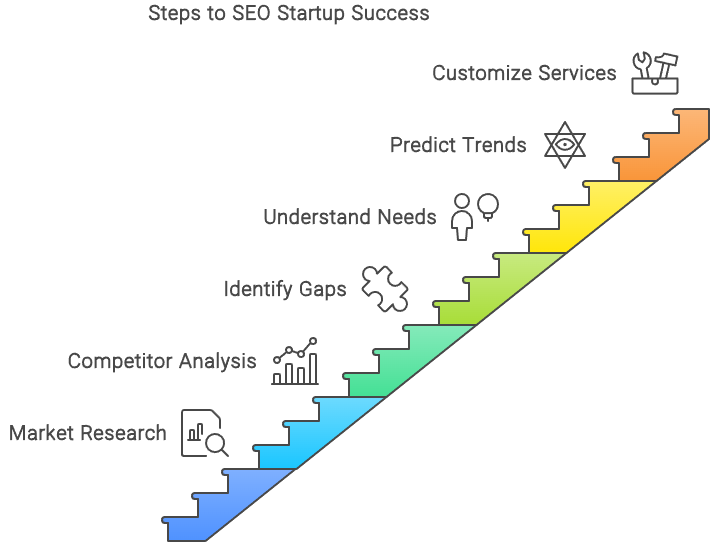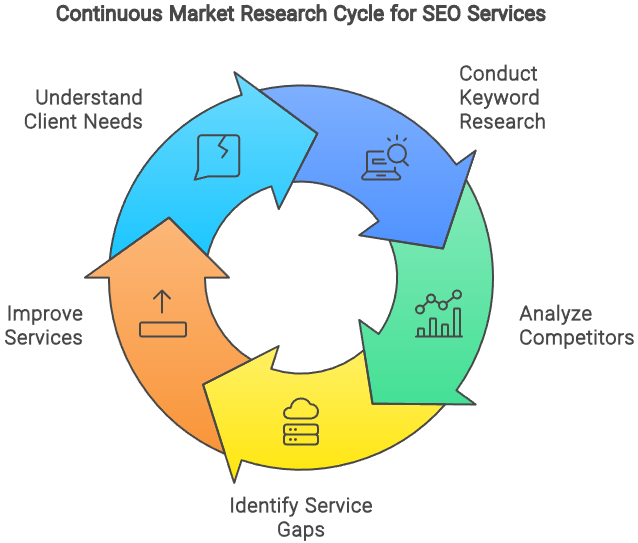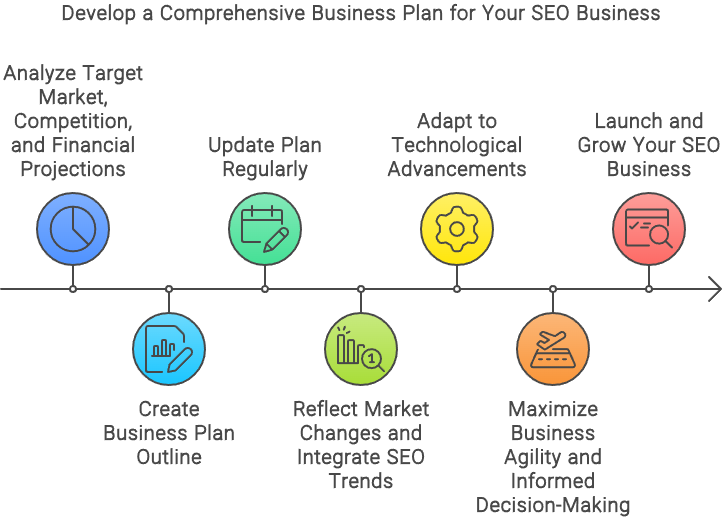Guide to Starting and Growing Your SEO Business
It's 2024, and the demand for effective SEO services continues to soar. If the entrepreneur within you is seeking to capitalize on this trend, you might be wondering "How do I start an SEO business?" or "How do I get my first clients?"
This comprehensive guide provides you with actionable insights, step-by-step guidance, and valuable tips to help you not only kickstart your SEO venture but also outperform your competitors.
Ready to launch your business?

Phase 1: Understanding the SEO Industry
1. The Growing Demand for SEO Services
The demand for SEO services is rapidly increasing as businesses strive for online visibility. Even in regions like Malta, where the business environment has been traditionally relaxed, companies now realize that a strong online presence is essential for survival. The global SEO market is projected to grow at 8.7% annually, potentially reaching $122.11 billion by 2032. The shift toward e-commerce and mobile browsing has made SEO indispensable. With online sales expected to account for 21.2% of all retail sales by 2024, businesses must optimize their digital presence to stay competitive. Trends like AI-driven SEO—where 75% of professionals anticipate AI will handle most SEO tasks by 2024—are revolutionizing the industry. Additionally, the emphasis on technical SEO and user experience (UX), such as mobile optimization and faster page loads, is critical for improving search rankings and engaging users.

This surge in demand is driven by several key components which highlight the critical factors contributing to the increasing need for SEO expertise:
- Specialized Expertise: As SEO becomes more complex, businesses require specialized skills to navigate the intricacies of search algorithms, technical SEO, and content strategy. Agencies equipped with this expertise are essential for businesses aiming to improve their rankings and online performance.
- Consumer Behavior: The way consumers search and interact online is constantly evolving. With more people using search engines to find products, services, and information, businesses must adapt their strategies to meet these changing behaviors, making SEO services indispensable.
- Business Visibility: In a crowded digital marketplace, standing out is crucial. SEO enhances business visibility by improving search engine rankings, which drives more organic traffic and potential leads.
- E-commerce: The shift towards online shopping has accelerated the need for effective SEO strategies. With e-commerce sales expected to account for 21.2% of all retail sales by 2024, businesses must optimize their online presence to capture this growing market.
- Mobile-First Strategies: As mobile browsing overtakes desktop, search engines like Google prioritize mobile-friendly websites in their rankings. Businesses need to adopt mobile-first strategies to ensure their sites are optimized for this shift, further driving the demand for SEO services.
Understanding these factors is key to capitalizing on the expanding SEO market. With the demand for SEO specialists projected to grow by 22% from 2020 to 2030, there's a prime opportunity for entrepreneurs to launch successful SEO businesses by focusing on these critical areas.
What is an SEO Agency?
In 2024, SEO agencies are essential partners for businesses aiming to improve their online visibility and drive organic traffic. These agencies offer a comprehensive range of services, including:
- Keyword Research: Identifying relevant search terms that potential customers use.
- On-Page SEO: Optimizing individual pages to rank higher and earn more relevant traffic.
- Off-Page SEO: Building backlinks and improving the site’s reputation.
- Technical SEO: Enhancing website infrastructure for better crawling and indexing by search engines.
- Content Marketing: Creating and distributing valuable content to attract and retain customers.
- Local SEO: Optimizing for local search results to attract customers in a specific geographic area.
- Analytics and Reporting: Monitoring performance and making data-driven decisions.
These services are designed to improve a website's search engine rankings, attract targeted traffic, and increase leads and sales. As search algorithms and consumer behavior evolve, partnering with an SEO agency ensures that businesses remain competitive while focusing on growth.
The Role of an SEO Agency in Business Growth
SEO agencies do more than just improve search rankings—they drive business growth. By increasing visibility, they help businesses attract a larger audience, convert more leads, and ultimately increase revenue. For businesses without in-house expertise, an SEO agency provides the knowledge and tools needed to navigate the complexities of digital marketing.
Moreover, SEO agencies stay current with the latest trends and technologies, ensuring their clients are always ahead of the curve. This adaptability is crucial for long-term success in the ever-changing digital landscape.
Phase 2: Building Your Skill Set & Operations ⚙️
2. Conduct Market Research
Do NOT skip this step! Market research is essential for the success of your SEO startup. It allows you to:
- Analyze Competitors: Understand what others in the industry are doing and identify where you can differentiate.
- Spot Opportunities: Identify market gaps that your business can fill.
- Anticipate Trends: Predict where the market is headed and adjust your services accordingly.
It also helps you understand what the market needs and wants are, and thus enables you to predict future trends, so you can customize your services accordingly. This will ultimately lead to happier clients and give you that competitive edge over your competition.
Tip: Start by doing keyword research and explore services within your target market. Take note of competitors, explore their services and what they offer, and identify what you can offer too—but better. Keyword research will also help you understand client needs and expectations.

3. Define Your SEO Business Objectives
Next, define clear business objectives—beyond financial goals. Create a comprehensive outline of your business’s purpose, mission, and vision. Grasp your overarching benefits (e.g., increased website traffic and visibility, increased credibility and trust from customers, enhanced conversion rates, better user engagement).
SEO goals could include direct sales increase, brand recognition, marketing specific products or services, etc., each requiring tailored approaches (e.g., keyword-targeted content for traffic vs. brand-building strategies for authority).
Tip: Identify your target markets, services to offer, unique selling propositions (USPs), and profit streams and targets.

4. Create a Business Plan
Develop a comprehensive business plan to guide your venture. It should compel you to analyze your target market, competition, and financial projections for a thorough understanding of your business potential. Regularly update it to reflect market changes, integrate SEO trends, and adapt to technological advancements, keeping your business agile and informed.
Tip: Outline your business model, target audiences, revenue streams, and growth strategies.


Phase 2 (cont’d)
1. Mastering SEO Techniques
Mastering SEO requires theoretical knowledge and practical experience. Stay current with trends and algorithms, and get hands-on with keyword research, on-page optimization, off-page SEO, and analytics.
Tip: One of the most effective ways is to create and work on your own website. It's your playground—experiment, apply concepts, and understand real-time impacts. SEO is not one-size-fits-all; continuous learning, experimentation, and adaptation are key.
2. Developing a Solid Portfolio
A strong portfolio is tangible proof of your skills and accomplishments. Start with diverse projects—your own website or those of friends/family. Document your process, strategies used, results achieved.
Experiment with SEO tools and techniques to build a comprehensive portfolio that demonstrates ability in improving rankings and driving traffic—a powerful tool to attract clients.
3. Outsourcing & Freelance
SEO covers keyword research, content/on-page optimization, off-page optimization, technical SEO—a lot to master. Outsourcing allows access to global talent to fill gaps in expertise. For example, if link-building is challenging, bring in an outreach specialist.
Freelancers help manage workload and avoid burnout. Platforms like Upwork and Fiverr offer portfolios and pricing for selecting the right match. But the key is clear communication and project management to align internal and external teams effectively.

Phase 3: Effectively Selling SEO Services
1. Benefits of Hiring SEO Agencies
For B2C businesses, hiring an SEO agency offers advantages:
- Expertise across SEO domains—from technical SEO to link-building.
- Time savings for business owners, enabling focus on core operations.
- Audience targeting to attract meaningful traffic, which improves conversion rates.
Emphasize these benefits when pitching your agency.
2. Educating Potential Clients
Many businesses don't fully understand SEO's value. Educate them on its impact on online presence, traffic, and bottom line. Use case studies and real-world examples to illustrate success stories.
3. Transparent Pricing and Packages
Outline your pricing and services clearly. Transparency builds trust and helps clients understand their value. Offer customizable packages tailored to diverse client needs.

Phase 4: Managing Your SEO Business
1. The Role of an SEO Manager
As your business grows, you'll take on SEO manager duties—overseeing projects, client relationships, and staying current on industry trends. Develop strong organizational and leadership skills to manage your team and deliver exceptional results.
2. Utilizing Project Management Tools
Use tools like Asana, Trello, or Jira to streamline operations. They help track tasks, deadlines, and communication with both your team and clients.
Conclusion
Starting and growing an SEO business requires a blend of technical expertise, business acumen, and effective client management. By understanding the intricacies of the SEO landscape, continuously improving your skills, and implementing strategic business practices, you can carve a successful niche in this dynamic industry. Remember, patience, persistence, and a commitment to staying ahead of the curve will be your keys to long-term success in the competitive world of SEO entrepreneurship.

